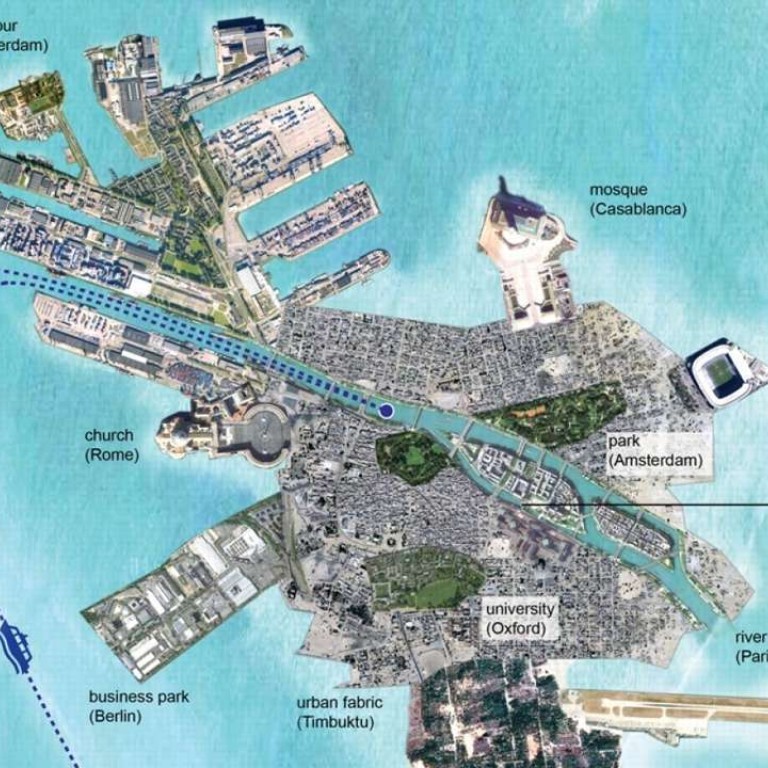
Could Europe’s refugee crisis be solved by building them a new country on a man-made island?
Europe is now years into a refugee crisis of historic proportions, and there’s no end in sight.
Even well-intentioned efforts to stem the crisis have struggled: one high-profile diplomatic arrangement designed to cut the migration route through Turkey and Greece into Eastern Europe appears to have unintentionally diverted refugees toward even more perilous journeys from North Africa across the Mediterranean. The Institute of Migration says at least 1,000 people have died making that journey in the past week alone.
The sheer intractability of the problem has spawned a number of wild suggestions for imaginative - though not necessarily practical - solutions. The latest may be one of the most audacious: a proposal to build a man-made island off the coast of Tunisia that would serve as a new country for refugees hoping to make it to Europe.

Deutinger dubs the project “Europe in Africa” (EIA), and it already has a flashy website that prominently features the enticing tagline: “The first truly European city.”
According to the plan, EIA would be a city-state established in the Tunisian Plateau - a thin strip of seabed that sits between the exclusive economic zones of Tunisia and Italy within the Mediterranean. The European Union would rent this land from those two countries on a 99-year contract, Deutinger reasons, and then create a landmass that would serve as a new country “with its own constitution, economy and social system” under the protection of the European Union. He suggests that the city might be like Carthage, the ancient city that was the center of Carthaginian civilization and was located in what is now Tunisia.
Reached via e-mail, Deutinger explains that tagline: The EIA would be the first city that is a part of Europe but not a part of any European nation state. Additionally, it would be bound by the European constitution - a planned continent-wide constitution that was never ratified after French and Dutch citizens voted against it. “So, Europe in Africa would also be a testing ground for the lately troubled European Union,” Deutinger writes.
Deutinger hopes the setting of the country could combine the best aspects of Europe and Africa. He says refugees he has been helping with languages classes have embraced the idea. “It was received very positively since it is located in a familiar climate zone most of the people are from,” he explains. “Interestingly enough, the largest complaints after the difficulty of learning the new language and the very cold attitude of the Europeans was the weather. In the Netherlands, where our office is located, people are waiting for a summer that will never come.”
EIA would be designed to accept everyone who wants to join it. Refugees like those dying in shipwrecks across the Mediterranean would be welcomed, as would economic migrants. There would be regular boats from North Africa to allow refugees and migrants. While on the island, new arrivals would be a given a chance to work. “One has to imagine the beginning of this city as the beginning of an American pioneer town,” Deutinger says, with larger European companies coming in only later so as to not disrupt the economy as it grows. Those who live on the island wouldn’t be granted automatic EU citizenship, but they could gain it after five years of living in EIA.
Similar ideas have been touted before.
Last year, San Francisco real estate tycoon Jason Buzi proposed a “Refugee Nation” that was far less specific though broadly similar to Deutinger’s EIA idea. Egyptian telecom billionaire Naguib Sawiris subsequently announced his plan to buy a number of islands that could be established as some kind of haven for refugees.
Deutinger admits that his plan was at least partially informed by those ideas, but his project has been ongoing for two years now.
“It would have to be a utopia or it would become a dystopia,” Bill Frelick, director of refugee rights at Human Rights Watch, said about Buzi’s Refugee Nation idea last year. Other experts agreed, with some pointing out that the creation of a new country for refugees was an attempt at solving Europe’s refugee problem, rather than solving the problems that cause people to become refugees.
Deutinger seems aware of some of the criticisms his idea is likely to face. “EIA will not become a Ceuta or Melilla since it does not belong to any nation,” he writes, referring to the Spanish cities that reside within the landmass of Morocco. “EIA will not be colonial since it belongs to its inhabitants and not to any European nation. EIA will not be a ghetto since it will not be fenced.” Deutinger says he is working with a team of students from the University of Eindhoven on filling out the concept and making it a real plan rather than a loosely mooted idea.
As yet, there’s no real political will behind the project - Deutinger says that he has spoken to some Dutch politicians but that they have not made any inroads in Brussels. He hopes public attention will help him reach out to the EU.

